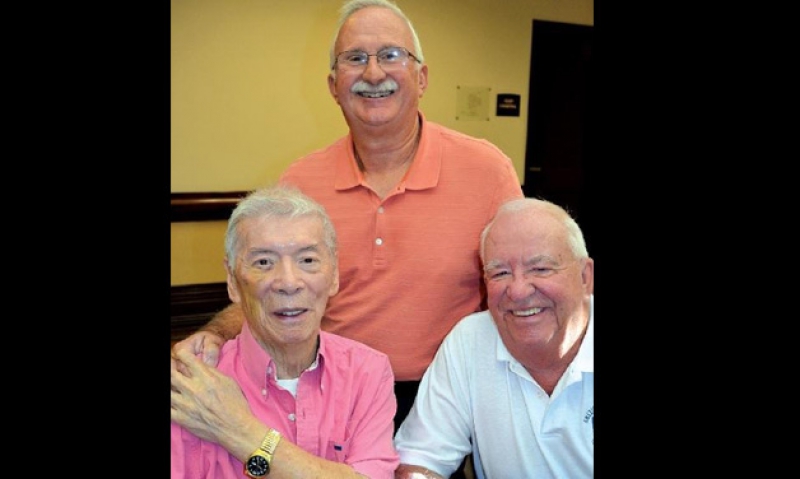
The medal was more than 60 years overdue when the Legion took the project on.
Photo courtesy of Regina Ford | Green Valley News | Standing: Tony Day Seated: Wong Suey Lee and Al Fisch
What started as a project to do right by a veteran with a compelling story turned into a contest against bureaucracy and mortality, as American Legion Post 66 in Green Valley, Ariz., worked to get Wong Suey Lee his Bronze Star with a “V” device as his health worsened. The medal was more than 60 years overdue when the Legion took the project on.
“We felt it was something he should have received,” said Al Fisch, Sons of The American Legion member. “If you knew Wong Suey Lee, you would know part of the reason why we did it. He was a gentle person. He overcame so many things.”
Lee’s father moved from China to Canada at the turn of the 20th century, his mother following later. Lee was born in Canada in 1926, Fisch said, and at 18 he decided there were more opportunities for him in the United States and moved to Washington. He joined, serving at Ft. Lewis, started his college education on the GI Bill and was called back to active duty from the Reserves during the Korean War.
“He suffered great prejudice at that time,” Fisch said. He said Lee began his tour of duty about the time China entered the war. In spite of this prejudice, Lee “became a favorite of his platoon by the time he committed his act of valor.”
According to Rep. Ron Barber’s (D-Ariz.) website, on June 3, 1951, Lee, a corporal in F Company, 7th Calvary Division, “... encountered a number of enemy positions, drawing heavy fire and killing an enemy soldier.
“Having cleared enemy forces from two entrenched positions, taking fire from small arms and mortar rounds, Lee gallantly exposed himself to that fire and rallied his squad leaders to take on a third enemy position upon a nearby steep hill. Lee tended to the wounded around him, as the platoon took aim and neutralized the enemy on the small hill. He then scaled that hill, dodging grenades and coming face-to-face with enemy soldiers, killing three at point-blank range.”
Though his commander recommended him for the Silver Star, the paperwork got lost in the shuffle - no witnesses, no medal. After his commander found nothing had come of it, he re-submitted the application in 1989. Again: nothing.
“(Lee) like a lot of veterans carried some emotional damage away from Korea, but he still got on with his life,” Fisch said. “When he retired, it kind of came to the surface again.”
With those emotions came an interest in looking into receiving the medal.
He enlisted the help of friend, Navy veteran Tony Day. Day, Fisch and Post Commander Pat Pitrello worked to get Lee the Medal of Valor for post member Kee.
“This is what Legion posts are all about, taking care of our veterans,” Pitrello said.
“So it was a little extra special considering here was a man who came over to our country, joined the service so he could become a citizen, fought in Korea bravely and we just felt that was an added reason to take this on and do something with it.”
Lee had copies of the original application, which the group took to Barber, and they began the hunt for witnesses. In the original documents, there were no listed witnesses, which “held everything up.”
They were able to find two witnesses, so many decades later, and one was actually Lee’s “foxhole buddy,” David Prescott, who had been with him that day. Prescott sent a letter to Barber. “That kind of sealed the deal,” Fisch said. The project was expedited - the application resubmitted (again) in September.
On Oct. 28, Lee listened, while receiving oxygen in the hospital, to someone read what Barber would state into the congressional record, his story of valor, where Fisch said there it would last “for eternity.” Though Lee was conscious and could hear, his health was fading.
“Then the next day, he passed away in the afternoon and I think they got the award notification ... something like two or three hours after he died,” Fisch said.
Lee would receive - posthumously - the Bronze Star with a “V” device for valor (not quite meeting the requirements for a Silver Star), while he was in the hospital.
“Probably had the government not shutdown in the fall ... (Lee) probably would have gotten the award while he was still alive. ... In this particular case it became very personal,” Fisch said.
The Legion would give the medal, presented by Barber, to Lee’s nephew, Dr. Denis Hom, during a special ceremony, a large annual program held on Pearl Harbor Day.
“All members of the committee felt it was the most worthwhile effort any of them had made as members of the American Legion Family,” Pitrello wrote.
- Honor & Remembrance

